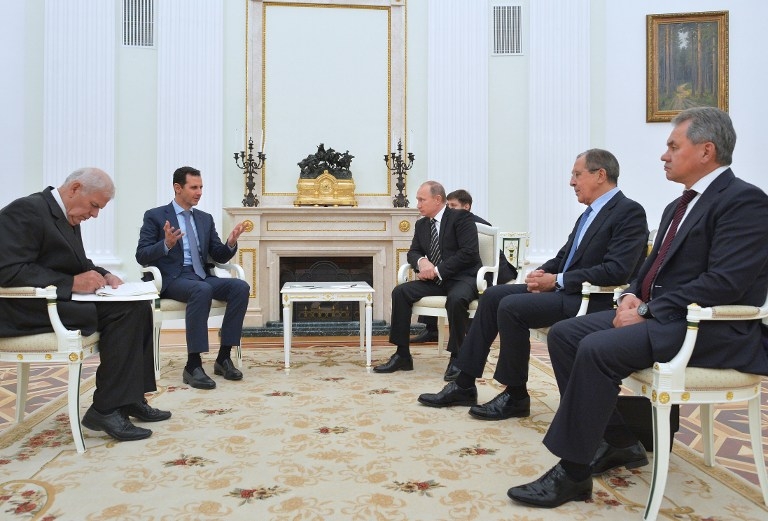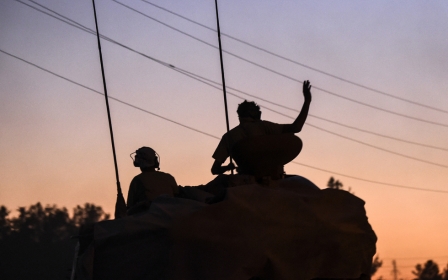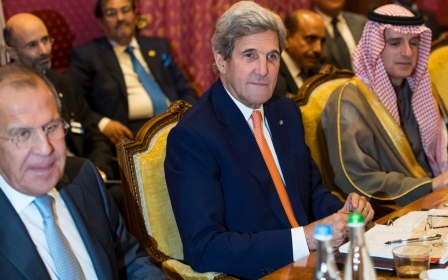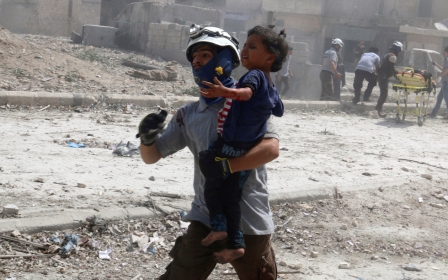Syria opposition denies taking part in talks ahead of Kazakh peace meeting

Russia's foreign minister said on Tuesday that the Syrian government was holding talks with the opposition ahead of a planned meeting in Kazakhstan, but a representative of Syria's main anti-government alliance swiftly denied any involvement in the talks.
Russia's foreign minister, Sergei Lavrov, was cited by the Interfax news agency as saying that Tuesday’s Syria talks were being held to lay the ground for the Astana conference.
"We in the High Negotiations Committee certainly have no connection to this matter," George Sabra, a leading member of the opposition coalition, told Reuters.
The HNC includes armed groups fighting Bashar al-Assad under the banner of the Free Syrian Army, and took part in a failed bid to launch peace talks earlier this year. The HNC was established in Saudi Arabia with Riyadh's backing in December 2015.
President Vladimir Putin has said that Russia, Iran, Turkey and Assad have all agreed that the Kazakh capital Astana should be the venue for new Syrian peace negotiations.
Russia-Turkish consultations
The RIA news agency cited an unnamed diplomatic source earlier on Tuesday as saying that representatives from the Russian and Turkish militaries were holding consultations with the Syrian opposition in Ankara about how a possible nationwide ceasefire might work.
The foreign ministers of Russia and Turkey had agreed in a telephone conversation on Tuesday to push for a ceasefire in Syria and to prepare for possible peace talks planned in the Kazakh capital of Astana, Russia's foreign ministry said in a statement.
During the conversation "the importance was stressed of a rapid completion of agreements on practical parameters to end military actions [in Syria], the separation of the moderate opposition from terrorist groups, and preparations for the meeting in Astana," the statement said.
Russia, Iran and Turkey backed a declaration to revive the Syria peace talks while supporting the principle of Syria's territorial integrity during a meeting in Moscow last week.
'Hostile act'
Also on Tuesday, Russia said that a US decision to ease restrictions on arming Syrian rebels had opened the way for deliveries of shoulder-fired anti-aircraft missiles, a move it said would directly threaten Russian forces in Syria.
Foreign Ministry spokeswoman Maria Zakharova said the policy change easing restrictions on weapons supplies had been set out in a new US defence spending bill and that Moscow regarded the step as a hostile act.
US President Barack Obama, who has been sharply critical of Russia's intervention in Syria, signed the annual defence policy bill into law last week.
"Washington has placed its bets on supplying military aid to anti-government forces who don’t differ that much from blood thirsty head choppers. Now, the possibility of supplying them with weapons, including mobile anti-aircraft complexes, has been written into this new bill," Zakharova said in a statement.
"In the administration of Barack Obama they must understand that any weapons handed over will quickly end up in the hands of jihadists," she added, saying that perhaps that was what the White House was counting on happening.
The US decision was a direct threat to the Russian air force, to other Russian military personnel, and to Russia's embassy in Damascus, said Zakharova.
"We therefore view the step as a hostile act.
Zakharova also accused the Obama administration of trying to "put a mine" under the incoming administration of President-elect Donald Trump by attempting to get it to continue what she called Washington's "anti-Russian line".
The Obama administration has in recent weeks expanded the list of Russians affected by US sanctions imposed on Moscow over its actions in Ukraine.
New MEE newsletter: Jerusalem Dispatch
Sign up to get the latest insights and analysis on Israel-Palestine, alongside Turkey Unpacked and other MEE newsletters
Middle East Eye delivers independent and unrivalled coverage and analysis of the Middle East, North Africa and beyond. To learn more about republishing this content and the associated fees, please fill out this form. More about MEE can be found here.




